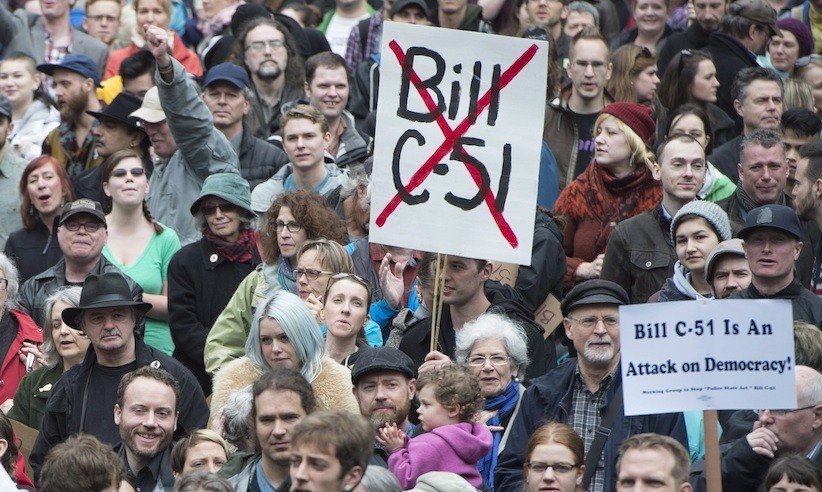Macleans: How Bill C-51 is clearly shaping the election
A new government could amend or repeal it before the end of this year. Let's keep building opposition to C-51 until October and then let's get it repealed: KillC51.ca Article by Aaron Wherry for Macleans C-51, the government’s anti-terrorism act, was given royal assent one week ago. Many provisions of the bill are now in force. But even with the Governor General’s signature, C-51 is still something of an open question—an unsettled matter of policy and politics.
On Wednesday, for instance, the Canadian Press reported on recently disclosed documents that raise questions about what changes had to be made to allow for government departments to share information—a controversial element of C-51 that was flagged by the privacy commissioner as a point of concern. Last week, a day before the bill received royal assent, Anonymous hackers overwhelmed government websites to protestthe anti-terror act. And in a recent run of interviewsLiberal leader Justin Trudeau to has had to once again defend his party’s position on the bill.
Even without the politics of an election year, there would surely still be questions about the implementation of the bill’s various measures, and lingering concerns about the oversight of national security operations. But with an election this fall, the fate of the new laws is actively unclear—in theory, a new government could amend or repeal C-51 before the end of the year. And not just because of those stakes does the spectre of C-51 seem, at least for now, to loom prominently.
Liberal angst
“I quite frankly—and this is maybe where I made a strategic or a calculation error—I didn’t think that people would be so divisive and so aggressive as to somehow make it seem like the Liberal party doesn’t care about the Charter,” Justin Trudeau recently told Maclean’s.
While the Conservatives stood behind their own bill and the New Democrats were loudly opposed, the Liberals chose to vote in favour of C-51 while calling for amendments. That might’ve insulated them against accusations of being soft on terror, but has opened them up to charges of being soft on civil liberties—and it has become fodder for the election within the election that is the battle to be the alternative to Stephen Harper.
- Read more at Macleans




 Take action now!
Take action now!
 Sign up to be in the loop
Sign up to be in the loop
 Donate to support our work
Donate to support our work